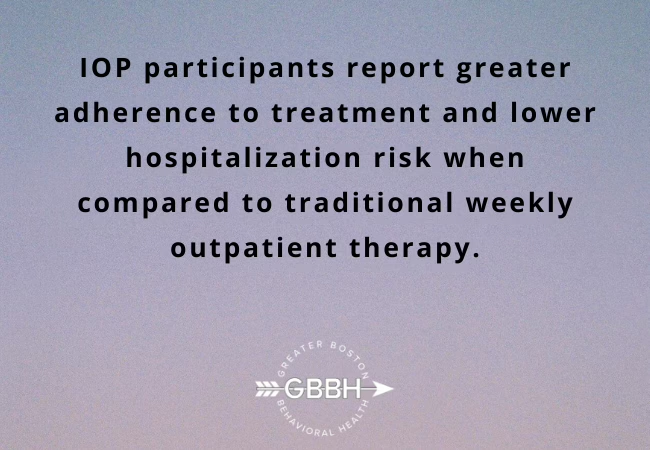If you or a loved one is facing mental health challenges, navigating the different levels of care can feel overwhelming. You may have heard of Partial Hospitalization Programs (PHP) and Intensive Outpatient Programs (IOP), but understanding the differences—and knowing which one is right for you—isn’t always clear.
At Greater Boston Behavioral Health, we offer both PHP and IOP as part of our comprehensive Mental Health Programs in Boston. These programs are designed to support individuals with anxiety, depression, trauma, mood disorders, and other mental health conditions—without the need for full inpatient hospitalization.
In this article, we break down the core differences between PHP and IOP, explain who benefits most from each, and help you make an informed decision about your mental health care.
What Is a Partial Hospitalization Program (PHP)?
A Partial Hospitalization Program is the most intensive level of outpatient care available. PHP provides structured, full-day treatment—typically 5 days a week for 4–6 hours per day—while allowing clients to live at home or in a supportive environment.
At Greater Boston Behavioral Health, our Partial Hospitalization Program in Boston includes:
- Daily group therapy sessions
- Weekly individual therapy
- Psychiatric evaluation and medication management
- Cognitive Behavioral Therapy Boston (CBT)
- Dialectical Behavior Therapy in Boston (DBT)
- Trauma-informed care
- Psychoeducation and life skills training
- Support for co-occurring disorders, including substance use
PHP is ideal for individuals who need significant support to stabilize symptoms, develop coping skills, and prevent hospitalization—but who do not require 24/7 supervision.
What Is an Intensive Outpatient Program (IOP)?
An Intensive Outpatient Program offers a step down from PHP, providing therapeutic care several times per week—typically 3–5 days a week for 2–4 hours per session.
Our Intensive Outpatient Program in Boston includes:
- Weekly individual therapy sessions
- Group therapy focused on emotional regulation, trauma, and relapse prevention
- Skills groups utilizing CBT and DBT techniques
- Medication management through Psychiatric Care in Boston
- Specialized services like Anger Management Therapy in Boston
IOP is designed for individuals who are experiencing moderate symptoms and need more than weekly therapy—but are still able to maintain work, school, or family responsibilities.
PHP vs. IOP: A Side-by-Side Comparison
| Feature | PHP | IOP |
|---|---|---|
| Intensity | Higher | Moderate |
| Time Commitment | 5 days/week, 4–6 hours/day | 3–5 days/week, 2–4 hours/day |
| Best For | Severe symptoms, relapse risk, recent hospitalization | Moderate symptoms, transition from PHP, escalating symptoms |
| Supervision Level | Daily psychiatric check-ins | Weekly or biweekly check-ins |
| Focus | Symptom stabilization, relapse prevention, life skills | Coping skills, emotional regulation, continued progress |
| Setting | Structured daytime care with return home at night | Flexible scheduling around work/school |
| Duration | 2–6 weeks on average | 6–12 weeks on average |
Who Benefits Most from PHP?
You may benefit from PHP if you:
- Recently discharged from inpatient or Residential Treatment Program in Boston
- Are experiencing frequent emotional crises or mood swings
- Have suicidal thoughts (but are not at immediate risk requiring 24-hour care)
- Struggle with daily functioning due to depression, trauma, or anxiety
- Need intensive support to avoid inpatient admission
- Require daily psychiatric care to manage medications and symptoms
PHP creates a safe, supportive, and structured environment that promotes stabilization and recovery—especially for individuals with complex diagnoses.
Who Benefits Most from IOP?
IOP may be right for you if you:
- Have completed PHP or inpatient care and are ready for a step-down
- Are managing work or school but need more support than weekly therapy
- Are experiencing moderate levels of depression, anxiety, or trauma symptoms
- Want to strengthen coping strategies to prevent relapse
- Need accountability and consistency while rebuilding independence
IOP allows you to work on your mental health without pausing your life, providing the therapeutic foundation to build lasting emotional stability.
How Therapy Differs in PHP vs. IOP
At Greater Boston Behavioral Health, both PHP and IOP utilize evidence-based therapies, but differ in intensity and delivery.
In PHP:
- You may participate in multiple therapy groups per day
- You’ll have more frequent access to your individual therapist
- Medication management is reviewed more regularly
- Deeper exploration of trauma, mood dysregulation, and co-occurring issues is possible
- Greater structure helps reduce emotional volatility or crisis episodes
In IOP:
- You attend fewer groups per week, allowing time for external responsibilities
- Therapy focuses on skill reinforcement, goal setting, and building routines
- Greater emphasis on real-world application of techniques learned
- Ideal for maintaining progress and transitioning back to daily life
Both programs include trauma-informed care, group support, family therapy, and specialized treatments such as anger management and mindfulness training.
When to Transition from PHP to IOP
Often, a continuum of care is the best approach. After achieving stability in PHP, many clients naturally transition to IOP for continued growth. This step-down approach allows for:
- Greater independence while maintaining therapeutic support
- Time to re-engage with work, school, or personal goals
- Continued medication management and symptom monitoring
- Reduced risk of relapse or regression
Our team ensures that transitions between PHP and IOP are smooth, intentional, and personalized, based on clinical progress and individual readiness.
Why Choose Greater Boston Behavioral Health?
At Greater Boston Behavioral Health, we offer a full spectrum of mental health services—from inpatient stabilization to PHP, IOP, and outpatient therapy. Here’s what sets us apart:
- Personalized treatment plans for anxiety, depression, trauma, and emotional dysregulation
- Expert clinicians trained in CBT, DBT, trauma therapy, and anger management
- Seamless transitions across levels of care with continuity of providers
- In-house Psychiatric Care in Boston for medication support and diagnostic clarity
- Compassionate, inclusive environment with a focus on whole-person healing
Whether you’re stepping down from crisis care or stepping up for additional support, we’ll guide you with compassion and expertise.
Conclusion
Understanding the difference between PHP and IOP is the first step toward finding the treatment that fits your needs. At Greater Boston Behavioral Health, our goal is to match you with the right level of care—at the right time—so you can heal and grow with confidence.
If you’re ready to stabilize your symptoms, build resilience, and move forward with structure and support, we’re here to help. Call us today at (888) 278-0716 to schedule a confidential assessment.
FAQ on IOP vs. PHP – What’s Right for You?
What is the main difference between PHP and IOP?
PHP is more intensive, providing 5 days a week of full-day care, while IOP offers a few hours of therapy per day, 3–5 days a week. PHP is ideal for severe symptoms, while IOP is great for moderate support.
Is PHP better than IOP?
Not necessarily—PHP and IOP serve different needs. PHP is better for stabilization and crisis prevention; IOP works well for step-down care or when more flexibility is needed.
Can I transition from PHP to IOP?
Yes. Many clients begin in PHP and step down to IOP as they stabilize. This gradual transition helps maintain progress while returning to daily routines.
Can I work or go to school during PHP or IOP?
IOP is designed to accommodate work and school schedules. PHP requires a more significant time commitment and may be best suited for those who can take time off during the day.
Do both PHP and IOP include medication support?
Yes. Both levels of care include access to psychiatric care in Boston for medication evaluation, adjustments, and ongoing monitoring.


